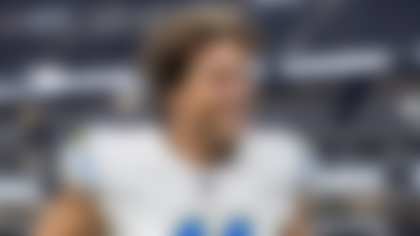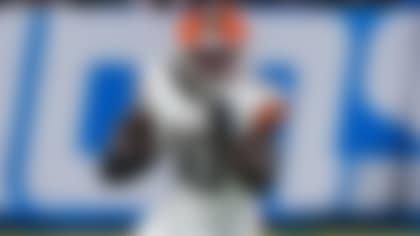The NFL's punishment to those involved with the New Orleans Saints' bounty scandal poses an ironic twist of sorts: By leveling a series of huge hits, the league hopes to enhance player safety -- and deter anyone, coaches included, from inciting otherwise.
On Wednesday, the league unveiled a series of unprecedented penalties:
•Saints head coach Sean Payton is suspended without pay for the entire 2012 season.
•Saints GM Mickey Loomis is suspended without pay for the first eight regular-season games of the 2012 season.
• The Saints are stripped of their 2012 and 2013 second-round draft picks and have been hit with a $500,000 fine.
This series of expected, but still resounding measures, more than anything, is a concussive warning to anyone employed by the league to scratch the term "bounty" from their vocabulary.
The NFL and Goodell are not playing around when it comes to player safety. So while Payton, Williams, Loomis, Vitt and the Saints organization as a whole are all are paying a dear price, they are collateral damage to a greater cause.
The 22-27 players cited in the initial report also will feel the impact of their involvement, but that will be coming at a later time. The NFL opted to delay the punishment to players because of the sheer volume of people involved and the diversity in sanctions that will be applied. In other words, they want to make sure the proper punishment fits the crime. Also, the NFLPA asked the NFL to delay discipline toward players until it finishes conducting its own investigation. That is taking place, and Goodell says he'll apply the NFLPA's recommendations to his own findings, then make a final decision.
Although the NFL said the discipline was streamlined to the pay-for-performance bounties the Saints engaged in from 2009-11, New Orleans also is paying for a term thrown around by those with knowledge of this investigation: arrogance.
Based on the league's thwarted initial investigation in 2010 and its findings following the discovery of legitimate information over the past few months, those being penalized are also paying for not cooperating, not taking warnings about this bounty thing seriously -- or thinking they were above it all -- and covering things up.
The NFL's findings were harsh, citing "Conduct Detrimental" by Loomis, Payton, Williams, the Saints and players. Had this been the NCAA, a term like "Lack of Institutional Control" would have been more appropriate. As we know, coaches and athletic directors have lost their jobs in those instances; programs have been put on probations and scholarships stripped. That's what this is akin to.
Although there could be players out there who think some of the punishment to their peers in pads is extreme -- especially since players seem to be the ones getting repeatedly fined and targeted (James Harrison), whereas coaches aren't (Tom Cable) -- there isn't much of an argument with the league's handling of this situation.
First off, the Saints, Loomis, Payton, Williams and Vitt were not spared. As a side note, neither are fans, players and staffs from New Orleans and St. Louis -- most of whom had nothing to do with this.
Secondly, with so much emphasis on player safety, it's going to be hard for any player not involved with the scandal to argue that the league can come down too hard on players that were involved. If these players were involved in a bounty system in which they were awarded money for trying to hurt players, can they really be defended? Suppose they came after a team's quarterback ... or any player, for that matter. Is that OK -- especially when so much of the players' argument during last summer's lockout centered on the short- and long-term health of players?
The NFL also was not keen on the fact that players primarily funded the bounty program, which is why some of those players -- like Saints linebacker Jonathan Vilma, who was cited for offering $10,000 as a bounty in the league's investigation -- could pay dearly. The practice of players spreading money around in all sorts of activities -- ranging from throwing juice bottles into trash cans from 20 yards away at practice to picking off passes inside the 20 -- is common. It's also excused, for the most part.
Debate: Saints' legacy impacted?
Will the Saints' victory in Super Bowl XLIV now carry an asterisk due to the bounty scandal? Our analysts debate. **More ...**
However, paying to have other players carted off the game field for a competitive edge and $1,000 (a night's worth of partying cash) is not what this commissioner is about. Players getting hurt and carted off the field is part of the game. Knowing a player could have been specifically targeted for such a result for bonus money sidesteps the integrity of guys doing what they normally do for the love of the game.
As bad as the league views the players' roles, the fact that coaches -- Williams not only admitted his involvement in New Orleans, but former players in Buffalo and Washington said he ran the bounty gig there, as well -- were involved was too much for the league not to come down as hard as it did. So was the Saints' knowledge of what was going on (if not first-hand, at least when the NFL came snooping around after the 2009 season). Still, the bounties continued, according to the NFL's findings.
It's also worth noting that the NFL took suggestions that there were bounty programs with other teams and investigated them. They found that there was no evidence that bounty programs were in place elsewhere but it would re-open investigations should new information come to light.
Again, arrogance was the word used by those with knowledge of the investigation. Not apathy nor ignorance nor even a lack of prioritization. Arrogance.
After these penalties, any thought of such bounties could -- and should be -- a thing of the past. If not, those involved -- based on the severity of these sanctions -- will be.
Follow Steve Wyche on Twitter @wyche89











